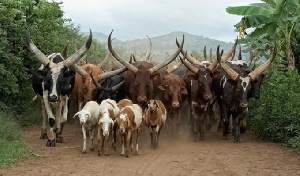Politicians have promised, times without number since 2012, to expedite action on the passage of the proposed ranching law to regulate the activities of foreign herdsmen and protect local peasant farmers.
Their words, often uttered on political campaign platforms, unfortunately, remain just words after they secure the mandate of the indigenes of the most affected towns such as Aberewapong, Mankala, Nyamebekyere, Kowereso, Adomemu, Bebuoso and Brahabebome all in the Agogo Traditional Area.
The challenge is not peculiar to farming communities in the middle belt and the north but also present in major city centers; where cattle are mostly seen crossing major roads and endangering the life of motorists and pedestrians.
Locals, after the elections, are left to their fate to fend off herds of cattle rampaging through their farms and robbing them of their livelihoods; while the proposed ranching law that would have compelled cattle owners to bridle their herd becomes hirsute on the corridors of power.
The Peasant Farmers Association, whose members are also affected by the menace, have therefore called on all political parties expected to contest this year’s elections to commit to passing the ranching law.
The ruling National Democratic Congress’ (NDC) 2016 manifesto is silent on the specific actions, programmes and policies to address the menace.
The largest opposition party, the New Patriotic Party (NPP) also gave no specific prescriptions to the phenomenon in their 2016 manifesto titled: “Change, an agenda for jobs.”
A ranching law was first proposed in 2012 after frequent clashes between locals and foreign cattle-herdsmen in many communities in the country and local authorities’ inability to contain livestock that stray onto the streets of various towns and villages. This raised conservation, security and safety concerns.
In 2012, a team from the Ministry of Food and Agriculture were sent to study the ranching law that Burkina Faso had successfully implemented, forcing the Fulani herdsmen to migrate down south.
However, nothing has been heard of the proposed law. In the meantime, indigenes and herdsmen have ben maimed and some reportedly killed during the many confrontation between the two groups.
A ranching law, as operational in other West African countries, prescribes that areas which will be utilised for breeding wild animals in captivity or semi-captivity must be fenced. Animals, under such a law, will not be subject to the restrictions established for hunting and are declared to be property of the breeder.
Ranchers would also be required to obtain a licence from local authorities for their business.
It still remains to be seen if the much-needed ranching law will see the light of day anytime soon.
Business News of Friday, 28 October 2016
Source: B&FT

















